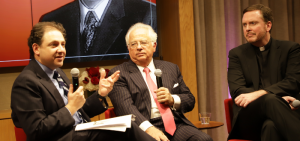Forty-seven years ago, five burglars were caught wiretapping phones and attempting to photograph top-secret documents from the Democratic National Committee’s Watergate headquarters. The White House initially denied any involvement in the break-in, but later was found to have paid “hush money” to the co-conspirators. President Richard Nixon resigned, rather than be impeached by the House Judiciary Committee, which already voted on three articles of impeachment against him.
In a conversation titled “U.S. v. Nixon at 45,” Philip Allen Lacovara, Esq., spoke with America magazine’s Editor-in-Chief Matthew F. Malone, S.J. about his involvement in the landmark Supreme Court case. America Media and Fordham Law presented the program, which was held on Dec. 4 at America Media’s William J. Loschert Studio.
Executive Privilege
Lacovara served as Deputy Solicitor General of the United States and appeared before the Supreme Court in July 1974 to argue United States v. Nixon. He recounted how he presented a 45-minute-long rebuttal before the Court, arguing that Nixon’s executive authority wasn’t absolute and that tapes shouldn’t be subject to executive privilege—a principle that had never been recognized in any prior case. Part of the litigation strategy was to convince the Court that audio recordings of certain Oval Office phone conversations were needed by the special prosecutor because they would reveal the truth.
As he closed his argument, Lacovara requested that the Supreme Court come to an “unavoidably firm, irrefutable” decision. “Yes, there is such a thing as executive privilege, and it’s a corollary of the Constitutional separation of powers—but it’s not absolute, and the courts can override it,” he observed, more than four decades later. “In this case, the interest in finding the truth in a dispositive way overrode [Nixon’s] claim of privilege.”
Saturday Night Massacre, Sunday Morning Scramble
Chief Justice Warren E. Burger ruled that executive privilege wasn’t valid in this situation and forced Nixon to comply with the trial subpoena. The Court’s willingness to come to a unanimous 8-0 decision was crucial to the outcome, according to Lacovara.
Soon after, White House officials and Nixon’s lawyers listened to 64 taped conversations, before they were handed over to the special prosecutor’s office. One of those tapes turned out to be the “smoking gun” recording, in which Nixon had talked about covering up the break-in, a few days after it took place. Once this information became publicly known, Nixon resigned as president in early August 1974. He was never indicted for his role in the scandal because succeeding President Gerald Ford granted him a pardon.

However, Lacovara acknowledged that the “Saturday Night Massacre,” which took place a year earlier, played a significant role in the litigation and outcome as well.
After refusing to adhere to the subpoena of turning over audio, Nixon ordered Attorney General Eliot Richardson to fire Special Prosecutor Archibald Cox for insubordination. Richardson refused to do so and resigned, which led to his successor William Ruckelshaus to do the same. The third-in-command, Solicitor General Robert Bork, eventually executed Nixon’s order. “[Nixon] had become considerably less popular and his conduct became much harder to justify, and I think that influenced the justices,” Lacovara said.
Fordham Law School Professor Jed Shugerman, who joined the evening’s conversation as first respondent, asked Lacovara to provide insight into what followed the next day, better known as the “Sunday Morning Scramble.” Lacovara said the entire staff, including spouses, secretaries, drivers, and Xerox operators, rallied together in the Washington office. “It was an amazing show of solidarity. We had to push our way past the FBI because, part of the order that had been given by General Alexander Haig [Nixon’s chief of staff] to the FBI, was to impound the office [and]not let anybody in,” he revealed. There was also a moment of doubt as some staff members contemplated resigning in solidarity with Cox.
Full Circle
The 45-year-old precedent, which said presidents do not hold unchecked power to declare executive privilege, has recently resurfaced in the current impeachment debate. On Dec. 18, the full House voted to approve the two articles of impeachment against President Trump, charging him with abuse of power and obstruction of Congress.
Since White House phone calls are no longer recorded, transcripts of conversations have been subpoenaed by House Democrats. Malone circled back to his earlier inquiry and posed the question, ‘Would the outcome of the current crisis be different if we had tapes or something as conclusive?’
Lacovara reasoned that while there aren’t any tapes, there are transcripts—albeit not verbatim—that can serve as evidence. “What is released by the White House as a fair description of that conversation is, in my view, supportive of the essence of the Ukraine accusation,” he said.

